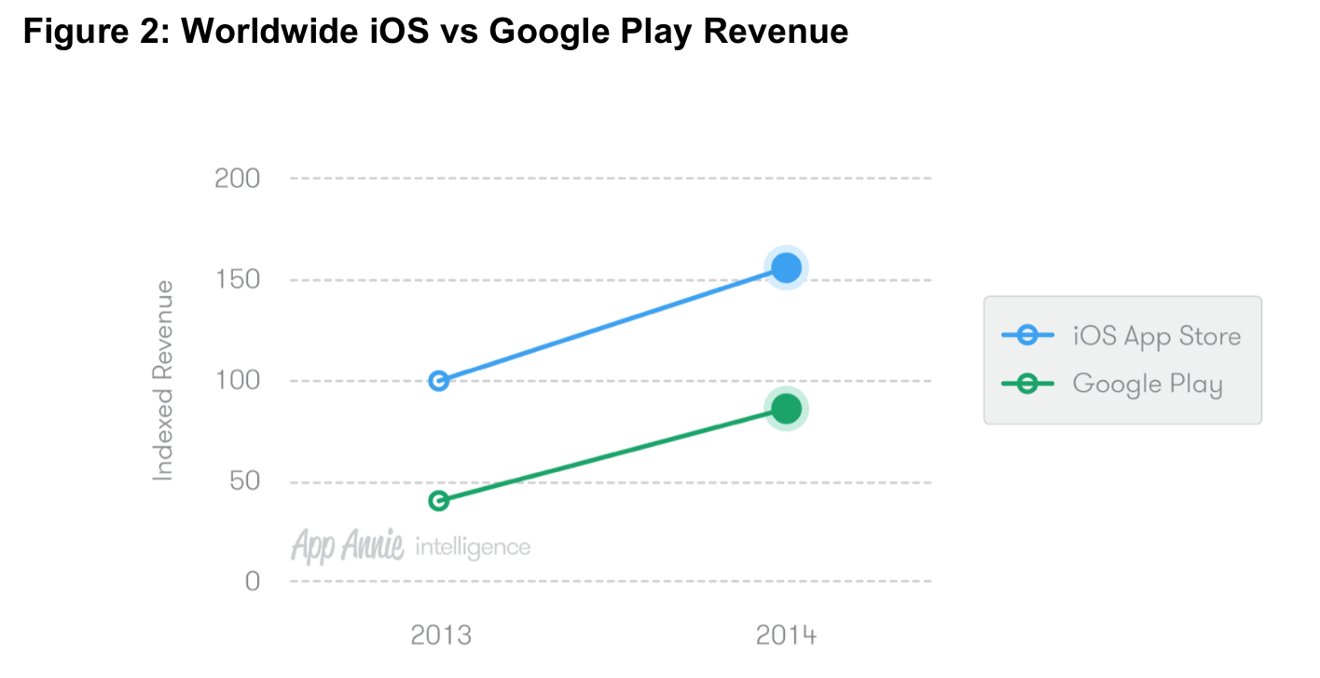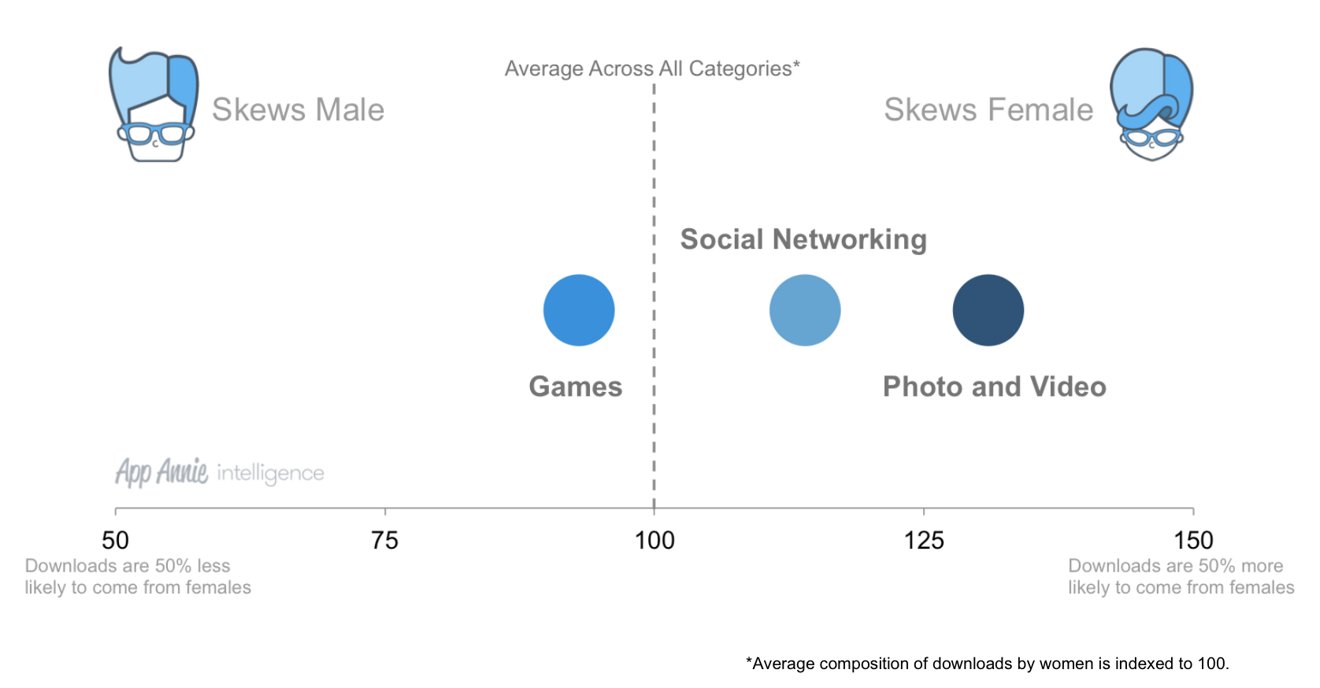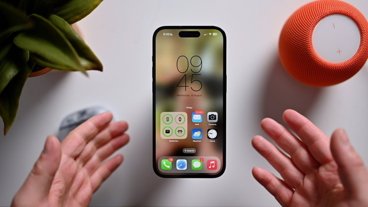Downloads still aren't translating to dollars for Google and developers who create applications for its Play store for Android devices, as Apple's iOS App Store remains far and away the most profitable digital storefront, according to the latest data.
New figures from mobile analytics firm App Annie published on Wednesday show that in 2014, Google Play had 60 percent more worldwide application downloads than Apple's iOS.
In terms of monetization, however, it's a very different story: The iOS App Store generated over 70 percent more yearly app revenue than the Google Play Store.
That's not because Google Play revenue didn't grow last year, either. Both stores posted strong revenue growth in 2014, but Apple's growth was on pace with its competitor, allowing it to maintain a significant lead in terms of dollars spent.
The new data comes after a record year for the App Store, in which developers generated over $10 billion in revenue. That's nearly half of the $25 billion developers have earned to date from the iOS App Store, showing that revenue is only accelerating on the digital storefront for iPhone and iPad.
And 2015 is off to an even better start, as Apple revealed earlier this month that New Years Day was the single biggest day ever in App Store history. In addition, the first week of January set a new record for billings from the App Store, with customers spending nearly a half-billion dollars on apps and in-app purchases.
As for exactly what users are downloading, App Annie's data shows that mobile games generally skew toward male users, while females are more interested in social networking and photo and video apps.
Most of the revenue on the iOS App Store and Google Play comes from a trio of nations that App Annie calls the "app store superpowers": Japan, South Korea, and the United States. Together, these three countries generated more revenue in 2014 than the rest of the world combined, the firm's data shows.
App Annie's data comes from analytics featured in software from over 90 percent of the top 100 publishers, and more than 700,000 applications.
 Katie Marsal
Katie Marsal








-m.jpg)






 Thomas Sibilly
Thomas Sibilly
 Wesley Hilliard
Wesley Hilliard
 Marko Zivkovic
Marko Zivkovic

 Malcolm Owen
Malcolm Owen

 Amber Neely
Amber Neely

-xl-m.jpg)








29 Comments
This appears to be just an extension of the market share argument made by fAndroids. They can claim the numbers but Apple makes all the profit. I still don’t fully understand the surveys that show Android users are basically cheapskates that don’t spend money on apps, don’t browse the web, and just don’t seem to use their devices for anything other than making phone calls.
The problem with both stores is that content is pretty much cross platform. Apple needs exclusive content. I would like to see them buy a game studio or cut exclusive deals with Disney. Maybe Jimmy and Dre can get exclusive music on iTunes also.
The problem with both stores is that content is pretty much cross platform.
Apple needs exclusive content.
I would like to see them buy a game studio or cut exclusive deals with Disney.
Maybe Jimmy and Dre can get exclusive music on iTunes also.
I don't know,... There's a lot of games that are iOS only.
This appears to be just an extension of the market share argument made by fAndroids. They can claim the numbers but Apple makes all the profit. I still don’t fully understand the surveys that show Android users are basically cheapskates that don’t spend money on apps, don’t browse the web, and just don’t seem to use their devices for anything other than making phone calls.
Aren't the majority of Android-based cell phones glamorized feature phones anyway that can't do much more than make calls? I would like to see what Google apps are actually downloaded, categorize them, and evaluate what level of phone they require. I would guess the majority of downloaded Google apps work on the simplest of phones, which is obvious, but that a whole lot less are actually written and downloaded for the better Android phones (whatever those are). It's always been my feeling that since Android is free, Android users don't want to pay for apps and really don't want to pay for phones. It's the typical linux world of everything should be free.
This proves the iOS ecosystem is very strong. Tim Cook said the key reason that Apple lost the personal computer market to Microsoft in the 80s/90s was that consumers went where the software was. Only creative pro software (Aldus, Adobe, etc) had a stronghold on Macs, which remained popular among creative professionals during those dark days, and they kept Apple in business. Cook views a strong app ecosystem as strategically vital, and the reason why the iPhone isn't going to be a repeat of what happened when Apple launched the Mac. The theory that app developers write for the biggest platform has some truth to it, but there were developers like John Carmack who said Android wasn't convincingly profitable, and that it required more overhead during development to test and tune for wide variations in hardware specs, enough so that they focused their efforts on iOS first.